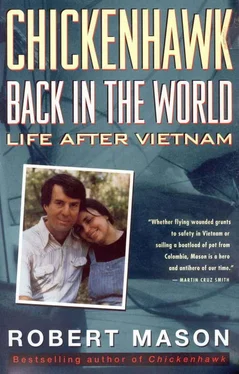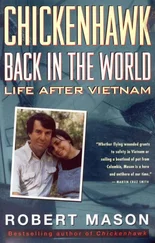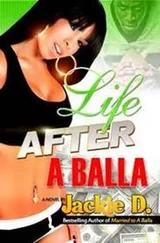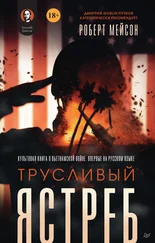“Good,” John said.
“Yeah. Great, John,” I said. “We have them exactly where we want them, eh? I mean, the only evidence they have on us is a fucking boatload of marijuana.”
“It could be worse,” John said, without much conviction.
“Shouldn’t we be getting a lawyer?” I said.
“The team’s probably figured it out by now,” John said. “We’ll be contacted.”
I nodded. Right, the team. The same idiots who spent six weeks watching that canal, except for the night we came in. That team.
I was too tired to argue anymore. The whole thing was a dream. I sat back against the wall and smoked a Salem. There was nothing to do but wait and watch the process we’d triggered when we bumped into the Customs boat. A whole crew of people trained in the disposition of captured criminals were now hard at work, and they did this every day. It was something to watch, a distraction from the despair I felt.
An hour later, two deputies came to the door and said we had a hearing with the magistrate. We left the cell and followed one deputy down the hall, trailed by another.
A sign on the door said Robert Carr, U. S. Magistrate. We went inside. DEA Agent Cook, who’d been at the scene of the arrest, was sitting against the wall near the magistrate’s desk. The magistrate offered us the three chairs in front of the desk. A stenographer, a woman, nodded curtly to us when the magistrate indicated she would be taking notes of the meeting. We sat.
“Gentlemen, a federal grand jury has just indicted you. The crimes you are charged with are possession of a controlled substance, marijuana; possession of a controlled substance, marijuana, with the intention to distribute a controlled substance; and the illegal importation of a controlled substance, marijuana.” The magistrate looked at us. “Each one of you is charged with the commission of all three of these crimes.”
I nodded dumbly, noticing that John and Ireland did the same. I wanted to ask how one crime could become three. And how if you multiply three crimes times three people, you now have nine crimes; and is that actually true? I mean—
“I’ll be setting bond for you men,” said the magistrate. “And I need some information to help me decide how much they’ll be.” He picked up a scratch pad and a pencil and asked John, “Your name?”
“John Tillerman.”
“Address?”
“P.O. box—”
“You have a street address?”
“One mile off state road 343, three miles south of High Springs, Florida.”
“Country place?” the magistrate said, his brow raised.
“Yeah, I like the country,” John said.
The magistrate nodded and asked, “What kind of work do you do, Mr. Tillerman?”
“I’m a carpenter,” John said.
“I see,” the magistrate said, making a note. “And who do you work for?”
“I’m self-employed.”
“Okay. And your approximate annual income from this line of work?”
And so on. The magistrate was taking what amounted to a credit application. He asked John all the usual questions: marriage status (married); education (college degree), references, and so on. I began to nod off from fatigue and boredom. Then I heard the magistrate ask, “And your name, sir?” I looked up to see that he was talking to me.
“Bob Mason,” I said.
“Robert Mason?”
“Yes. Robert Caverly Mason.”
“Caverly? That’s unusual.”
“It’s English.”
“Hmm.” The magistrate nodded. He then asked me the same set of questions. When he asked me what my profession was, I said, “I’m a writer.” It just popped out of my mouth.
“Really?” the magistrate said. “What sort of writing do you do?”
“I’m writing a book about being a helicopter pilot in Vietnam.”
“Really? Who’s the publisher?”
“Well, I don’t have a publisher yet. It, the manuscript, is in New York now. My agent’s trying to sell it.”
“Oh,” the magistrate said, clearly disappointed. Nearly everyone is interested in writers, but not so much interested in writers who are not published. Almost everybody knows an unpublished writer. In New York, where publishers collect tons of unsolicited manuscripts, they will tell you that it seems like almost everyone in America is an unpublished writer trying to get published. I kept asking myself angrily why I’d said I was a writer. I guess I was trying to impress someone at the lowest moment of my life: Hey, I have a manuscript; I have an agent; I’ve been to New York City.
“So, Mr. Mason, while you are waiting to sell a book, what do you do for a living?”
“My wife and I run rural paper routes for the Gainesville Sun.”
“And about how much do you make doing that?”
I couldn’t tell him the truth. It was just too dismal. Sure, I was dead meat on a hook, I was a captured crook, but I had my pride. I was not going to admit to this guy—who made sixty-five thousand a year—that Patience and I would, if I were working, bring in about twelve thousand a year. “Twenty thousand,” I said.
The magistrate cocked his head. Too much to believe. “Twenty thousand between the two of us,” I added.
“Oh,” said the magistrate, and marked it down on his pad. He asked me the rest of the questions and then did the same for Ireland.
When he’d gotten the personal information, he began asking DEA Agent Cook, as one of the arresting officers, questions about our crime. “Were there weapons involved in this crime, Agent Cook?”
“No, sir,” Agent Cook said. “We found a Winchester forty-four magnum, lever-action rifle on their boat. It was unloaded and stored in a case. We presume it was used as a shark gun.” That was true, and it was also incredibly fair of Agent Cook not to imply that the gun was part of our crime, considering it would’ve been easy to do so and would’ve added much to the seriousness of our charges. Who’d believe otherwise?
The magistrate nodded. “And approximately how much marijuana did you find on their boat?”
“Approximately three thousand pounds, sir.”
The magistrate nodded, looking over his glasses at us. It sounded like an awful lot, but it was also five hundred pounds short of what we thought we’d brought in. John and I glanced at each other.
“And what do you estimate is the value of that amount of marijuana?” the magistrate asked.
“At present street prices, we estimate that amount of marijuana is worth about two point four million dollars,” Agent Cook said.
The room was quiet for a moment. The stenographer looked up at us. When people start talking about millions of dollars, it attracts attention.
“Okay, gentlemen,” the magistrate said. “I have what I need in order to establish bonds for you. It’ll take my office a few days to check your backgrounds. I’m sure you understand?” He waited until we had all three nodded that was obviously the case. “Good. Then I will have a deputy take you to the Charleston County Jail, where you will be held until I’ve made my decision. Thank you for your cooperation.”
We waited in the holding tank down the hall while the federal deputies got the transportation details arranged. We asked for food, but they said we’d get lunch at the jail. A secretary from an office a couple of doors away brought us three cups of coffee on a plastic tray.
“You the pot smugglers?” she asked as she handed us the Styrofoam cups through the bars.
“Yeah,” John said. “That’s us.”
She let the tray drop beside her skirt, smiled, and shook her head. “Business isn’t so good today?”
“Not so good,” John said.
She watched until we sipped from the cups she’d brought and then smiled and went back to her office, a room like ours except it had no graffiti on the walls and no bars on the door.
Читать дальше












